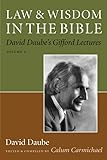Law and Wisdom in the Bible / David Daube ; edited and compiled by Calum Carmichael.
Material type: TextSeries: Daube, David. David Daube's Gifford lectures ; v. 2.Publication details: West Conshohocken, Pa. : Templeton Press, c2010.Edition: Vol.2Description: xii, 209 p. ; 23 cmISBN:
TextSeries: Daube, David. David Daube's Gifford lectures ; v. 2.Publication details: West Conshohocken, Pa. : Templeton Press, c2010.Edition: Vol.2Description: xii, 209 p. ; 23 cmISBN: - 9781599473451 (alk. paper)
- 1599473453 (alk. paper)
- 222.1606 23 DAU
| Item type | Current library | Call number | Status | Barcode | |
|---|---|---|---|---|---|
 Open Shelf Books
Open Shelf Books
|
Bishop Bukenya Library Open Access / General collection | 222.1606 DAU (Browse shelf(Opens below)) | Available | 153694 |
Includes bibliographical references (p. 181-201) and index.
The Fifth Commandment -- Deuteronomy -- Reasons for commandments -- Justice in the narratives -- Legal institutions in wisdom books -- The wise judge -- Reforms of machinery -- The example of the sage -- Mystification and disclosure -- The Torah.
David Daube (1909-1999) was known for his unique and sophisticated research on Roman law, biblical law, Jewish law, and medical ethics. In his second set of Gifford Lectures presented in April and May 1964, Daube derives from his complex understanding of biblical texts both ancient and contemporary notions of wisdom, justice, and education. His thinking bridges the gap between humanism and religion, especially with regard to Christianity and Judaism. With his sophisticated understanding of Talmudic law and literature, his thinking revolutionized prevailing perceptions about the New Testament
There are no comments on this title.
